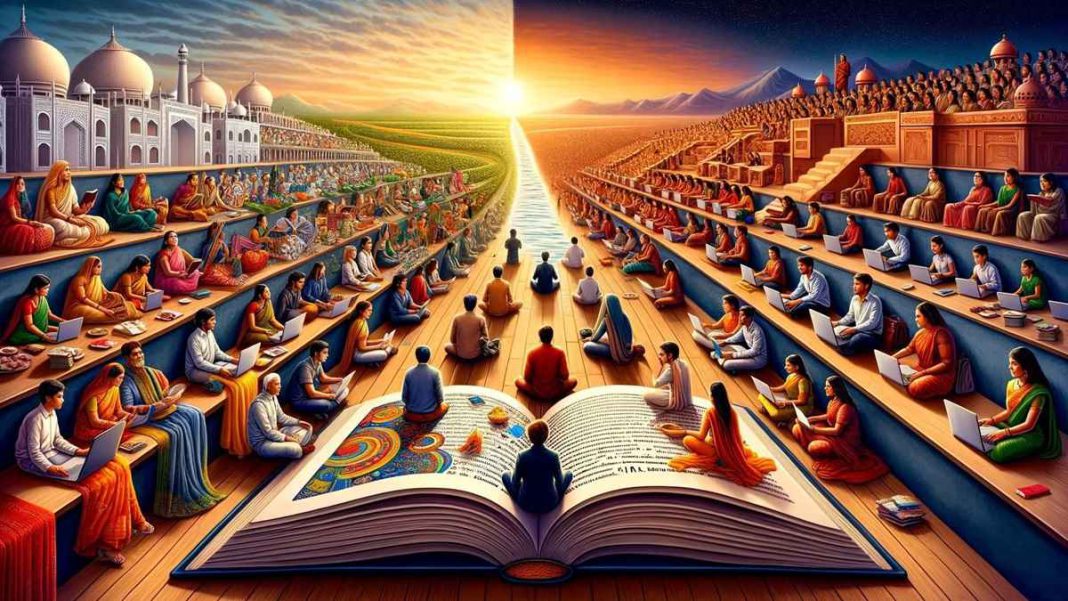INDIA: In the intricate tapestry of India’s socio-cultural evolution, the education system emerges as a paradoxical narrative of immense success shadowed by deep-seated challenges. As critics lament the shortcomings of the Indian education system, it’s crucial to acknowledge its undeniable prowess in nurturing minds that have gone on to helm global corporate titans. This phenomenon underscores a potent truth: despite its flaws, the post-independent Indian education system has been a cradle of universally acclaimed talent.
The irony, however, lies in the simultaneous reverence and repudiation of this system. On one hand, there’s a pervasive critique of the system’s failure to keep pace with modern educational demands, a sentiment not entirely unfounded. On the other, there’s a curious rush towards Western education models, notably the International General Certificate of Secondary Education (IGCSE) and the International Baccalaureate (IB), emanating from the very colonial legacy often blamed for the erosion of traditional Indian education. This dichotomy raises a compelling question: why the rush to adopt what’s foreign while undermining what’s inherently ours?
Also Read: The Plight of Educators in the Era of Industry 4.0: A Call to Action
This phenomenon can be seen as a form of ‘recolonisation’ of education, where reliance on Western pedagogical frameworks overshadows the potential within. It’s an echo of historical subjugation but in the realm of knowledge and learning. While the allure of IGCSE and IB systems lies in their global perspective and rigorous academic standards, it’s crucial to question the wisdom of embracing these at the expense of local educational identity. Why not channel the energy towards revitalizing the Indian education system with modern curriculum and pedagogical innovations that are attuned to global standards yet deeply rooted in the local context?
The answer, perhaps, lies in confronting the realities of access, quality, and relevance. The prohibitive cost of international curricula makes it an exclusive domain, out of reach for the vast majority. Moreover, the ‘alien pedagogy’ of these systems, while acclaimed, may not resonate with the cultural and contextual nuances of Indian society. It’s a stark reminder that education, at its core, should be about enhancing societal equity and fostering a sense of identity and belonging.
Also Read: Universities in the Rearview Mirror: Navigating the Disconnect in the Era of Industry 4.0
The educators, the very architects of learning, find themselves at the crossroads of this educational conundrum. The same teachers who navigate the nuances of the Indian curriculum are often the ones tasked with delivering these international programs, albeit with some “makeover upskilling.” This scenario presents a unique opportunity to bridge the divide. If educators can traverse these two worlds, why can’t the system at large?
The path forward involves a critical reassessment of values and priorities. Strengthening the Indian education system doesn’t mean an outright rejection of global ideas. Instead, it calls for a thoughtful integration of international best practices with indigenous knowledge systems, making education more inclusive, relevant, and transformative. It’s about building a system that respects the global context while celebrating local heritage and wisdom.
The discourse on the ‘recolonisation’ of education in India is not just about curriculum choices; it’s a deeper reflection on identity, sovereignty, and the future we envision for the next generation. As we stand at this crossroads, the challenge is not just to adopt or adapt but to innovate and inspire a truly inclusive and empowering educational paradigm. Let’s not forget, the greatest revolutions start not with a rejection of the past but with a visionary reinterpretation of it for the future.
Also Read: Higher Education’s Transformation: Methodology and Outcomes Lead, Content and Tech Follow



